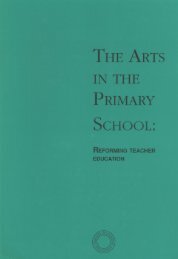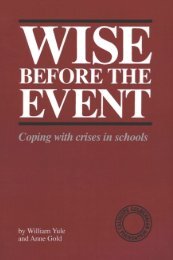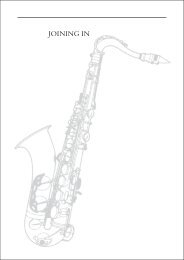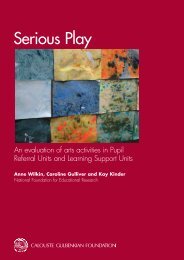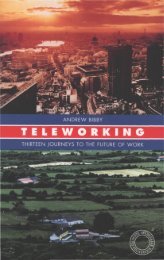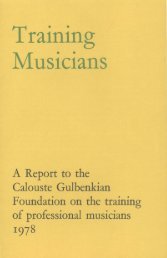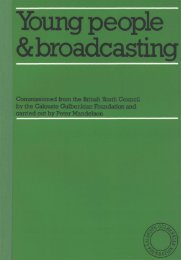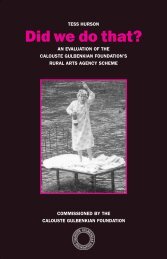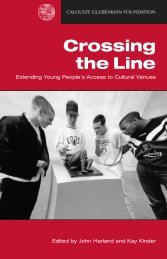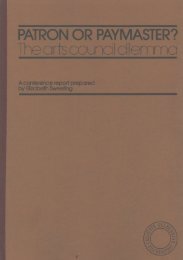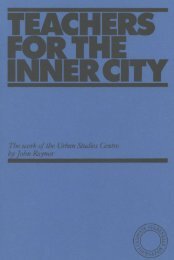The Arts in Schools - Calouste Gulbenkian Foundation
The Arts in Schools - Calouste Gulbenkian Foundation
The Arts in Schools - Calouste Gulbenkian Foundation
- No tags were found...
You also want an ePaper? Increase the reach of your titles
YUMPU automatically turns print PDFs into web optimized ePapers that Google loves.
Introduction—1989This is not a research report <strong>in</strong> the conventional sense. It is an attempt toarticulate and give force to the deep convictions of a widen<strong>in</strong>g group ofeducators, employers, parents and politicians about the nature and scope ofcontemporary education. <strong>The</strong> <strong>Arts</strong> <strong>in</strong> <strong>Schools</strong> was published <strong>in</strong> 1982 and hashad an unusual success, both <strong>in</strong> general and <strong>in</strong> stimulat<strong>in</strong>g many specificpractical <strong>in</strong>itiatives to implement its recommendations. Repr<strong>in</strong>t<strong>in</strong>g <strong>in</strong> 1989 itseems appropriate to take stock of the report's impact to date, and to relate itsarguments to the new context for state education <strong>in</strong> the 1990s created by theEducation Reform Act (1988) and the National Curriculum.<strong>The</strong> Education Reform Act came at the end of over ten years of public andprofessional debate on the role of state education. <strong>The</strong> debate was stimulatedby a Labour Prime M<strong>in</strong>ister, James Callaghan, <strong>in</strong> his speech at Rusk<strong>in</strong> College,Oxford <strong>in</strong> 1976. This was the first major policy speech on education by anyPrime M<strong>in</strong>ister and was guaranteed to be historic for that reason alone. <strong>The</strong>speech was prompted by <strong>in</strong>creas<strong>in</strong>g public and political unrest about educationand was bound, for that reason, to be controversial.As the recession deepened dur<strong>in</strong>g the 1970s and as unemployment <strong>in</strong>creased,especially among young people, there was a grow<strong>in</strong>g conviction that part if notthe whole of the problem lay <strong>in</strong> the schools. This view was succ<strong>in</strong>ctly put bythe Association of Chambers of Commerce which argued <strong>in</strong> 1979 that:<strong>The</strong> school system has to teach skills essential to modern life. If it fails,school leavers will be condemned to unemployment . . . This will haveserious repercussions on our society. Deprived of sufficient skills, Britishbus<strong>in</strong>ess will fail to defeat overseas competition and unemployment willcont<strong>in</strong>ue to rise.'Economic concerns were the obvious theme of the Rusk<strong>in</strong> speech. JamesCallaghan argued explicitly that education should be more closely geared tothe needs of the labour market. To achieve this he made his controversialproposal for a statutory core curriculum <strong>in</strong> all schools. <strong>The</strong> furore that thissuggestion provoked confirmed that the real unrest <strong>in</strong> education went wellxi



